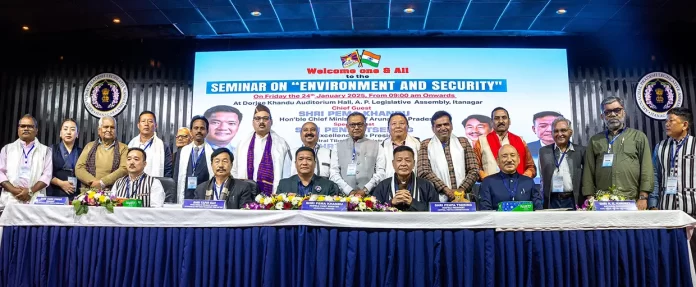ITANAGAR, 24 Jan: Chief Minister Pema Khandu on Friday expressed concern over China’s refusal to enter into binding international water treaties, and its selective sharing of hydrological data.
Speaking at the inaugural function of a seminar titled ‘Environment and Security’ at Dorjee Khandu auditorium of the legislative assembly here, Khandu drew the attention of all stakeholders towards the Chinese plan to construct the world’s largest hydropower project on the Yarlung Tsangpo river, which enters Arunachal Pradesh as Siang and becomes the Brahmaputra in Assam, before flowing into Bangladesh.
He said that the dam would allow China to control the timing and volume of water flowing downstream, which could have devastating effects during periods of low flow or drought. The Siang or the Brahmaputra river would dry up during winters,disrupting life in the Siang belt and the plains of Assam, he cautioned.
Conversely, Khandu said, sudden releases of water from the dam could cause severe flooding downstream, particularly during monsoon seasons, displacing communities, destroying crops, and damaging infrastructure. Furthermore, the dam would alter the sediment flow, affecting agricultural lands that rely on the river’s natural replenishment of nutrients, he said.
“China’s construction of the world’s largest hydropower dam on the Yarlung Tsangpo river poses significant risks to the water security, ecology, and livelihoods of millions of people downstream in Arunachal Pradesh, Assam, and Bangladesh. The potential disruption of water flow, flooding, and ecosystem degradation could have far-reaching consequences on us,” he said.
Highlighting that all major rivers of India originate from the Tibetan plateau, Khandu opined that the Chinese government’s rampant exploitation of Tibet’s natural resources poses a serious threat to the very existence of these river systems, upon which millions of Indians depend for survival.
“Tibet is often referred to as the ‘Water Tower of Asia’, supplying water to over a billion people in the region. Its environmental health is critical not only to China and India but to much of Asia. Therefore, India, given its direct dependency on Tibet’s rivers and climate patterns, has a significant role to play in global environmental conservation efforts,” Khandu said.
Commending the Tibet Support Group of Arunachal Pradesh (TSGAP) and the Core Group for Tibetan Cause (CGTC) for organising the seminar in Arunachal, the CM expressed hope that the discussions that would unfold here would play a vital role in finding solutions to mitigate the alarming environmental situation in Tibet, which poses significant risks to the entire region.
Khandu went on to elaborate the relationship of India with Tibet, especially in the context of Buddhism that dates back to the 8th century, when the Nalanda school of Buddhism was at its peak.
“Buddhism for centuries has been the connecting bond between India and Tibet, transcending to our state. Nalanda became the epicentre for the study of Buddhist philosophy, logic, ethics, and meditation, and its influence spread far and wide, including to Tibet, where it played a key role in shaping Tibetan Buddhism,” he said.
The seminar focused on the environmental situation in Tibet and its relation to India’s security. It was attended by Sikyong Penpa Tsering from the Central Tibetan Administration, Lok Sabha MP Tapir Gao, who is also the co-convener of the All-Party Indian Parliamentary Forum for Tibet, CGTC national convener RK Khrimey, Tibetologist Vijya Kranti,CGTC national co-convener Surendra Kumar,TSGAP president Tarh Tarak, and TSGAP secretary-general Nima Sangey, among others.
Representatives of the Arunachal Indigenous Tribes Forum and several CBOs also attended the seminar. (CM’s PR Cell)




